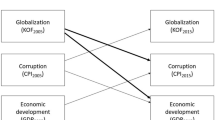Abstract
The presentation and paper for this conference go to the heart of the relationship between globalization and poverty worldwide. Data from the United Nations reveal the dramatic increase in exports and imports from 1990 to 2004, along with the uneven economic performance/quality of life across development groupings and geographical regions. Thus, findings suggest the possibility that trade growth has failed expectations that developing countries would rise to greater levels of productivity and subsequently reduce abject poverty. Nonetheless, the situation is far from hopeless and real progress can occur with a continued movement by transnational corporations toward socially responsible human rights, proactive governmental strategies that support productive dynamism, and removal of public policies that unfairly restrict less developed nations.
Similar content being viewed by others
References
Agenor, P.-R.: 2004, ‹Does Globalization Hurt the Poor?’, International Economics and Economic Policy 1(1), 21–51
Birdsall, N.: 2003, ‹Asymmetric Globalization: Global Markets Require Good Global Politics’, Brookings Review 21(2), 22–27
Chossudovsky, M.: 1998 ‹Global Poverty in the Late 20th Century’, Journal of International Affairs 52(1), 293–311
Dollar, D.: 2005, ‹Globalization, Poverty, and Inequality Since 1980’, The World Bank Research Observer 20(2), 145–175
Frederick, W. C.: 1998, ‹Creatures, Corporations, Communities, Chaos, Complexity’, Business and Society 37(4), 358–389
Frederick, W. C.: 2004, ‹A Biocultural Guide to Social Contract’, prepared for Contractarian Approaches to Business Ethics: The Evolution of Integrative Social Contracts Theory, November 12–13, University of Pennsylvania
Freeman, R. B. and J. Waldfogel: 2001, ‹The Occupational Wages Around the World Data File’, International Labor Review 36(Spring), 379–401
Harrison, A.: 2005, ‹Globalization and Poverty’, University of California at Berkeley and NBER (October), pp. 1–45
Hill, R. P. and B. Adrangi (1999), “Global Poverty and the United Nations,” Journal of Public Policy & Marketing, 18 (2), 135–146.
Hill, R. P., T. Ainscough and T. Shank: 2007, ‹Corporate Social Responsibility and Socially Responsible Investing: A Global Perspective’, Journal of Business Ethics 70(2), 165–174
Hill, R. P. and K. Dhanda: 2003, ‹Technological Achievement and Human Development: A View from the United Nations Development Programme’, Human Rights Quarterly 25(4), 1020–1034
Hill, R. P. and K. Dhanda: 2004, ‹Globalization and Technological Achievement: Implications for Macromarketing and the Digital Divide’, Journal of Macromarketing 24(2), 147–155
Hill, R. P., W. Felice and T. Ainscough: 2007, ‹International Human Rights and Consumer Quality of Life: An Ethical Perspective’, Journal of Macromarketing 27(4), 370–379
Hinsch, W.: 2001, ‹Global Distributive Justice’, Metaphilosophy 32(1–2), 58–78
Milanovic, B.: 2007, ‹Global Income Inequality: What It is and Why It Matters’, in Jomo K. S. and J. Baudot (eds.) Flat World, Big Gaps: Economic Liberalization, Globalization, Poverty & Inequality (New York: ZED Books Ltd), pp. 1–23
Rawls, John (1971), A Theory of Justice, Cambridge, MA: Harvard University Press.
Sachs, Jeffrey D. (2005), The End of Poverty: Economic Possibilities For Our Time, New York: Penguin Press.
Schneider, G. E.: 2003, ‹Globalization and the Poorest of the Poor: Global Integration and the Development Process in Sub-Saharan Africa’, Journal of Economic Issues 37(2), 389–396
Schrecker, Ted (2005) “Poverty.” Alternatives Journal, 31 (3), 20.
Snider, J., R. P. Hill and D. Martin: 2003, ‹Corporate Social Responsibility in the 21st Century: A View from the World’s Most Successful Firms’, Journal of Business Ethics 48(2), 175–187
UN: 2006, Trade and Development Report, 2006. (New York: United Nations Publication)
UNDP: 2006, Human Development Report: Beyond Scarcity. (New York: Palgrave Macmillan)
Author information
Authors and Affiliations
Corresponding authors
Rights and permissions
About this article
Cite this article
Hill, R.P., Rapp, J.M. Globalization and Poverty: Oxymoron or New Possibilities?. J Bus Ethics 85 (Suppl 1), 39–47 (2009). https://doi.org/10.1007/s10551-008-9945-3
Published:
Issue Date:
DOI: https://doi.org/10.1007/s10551-008-9945-3




